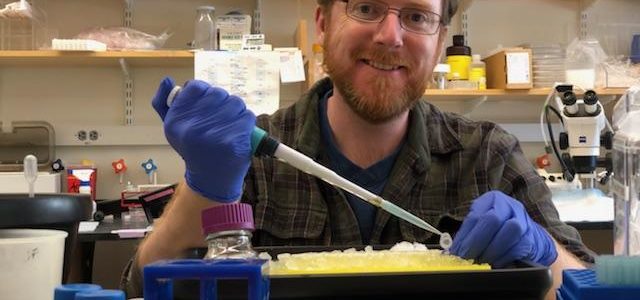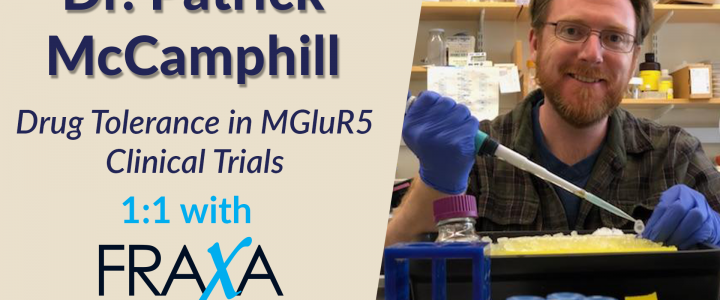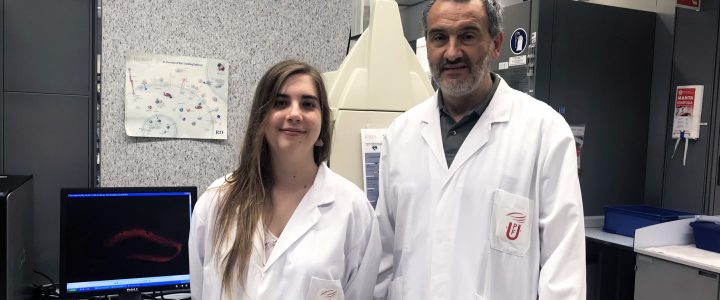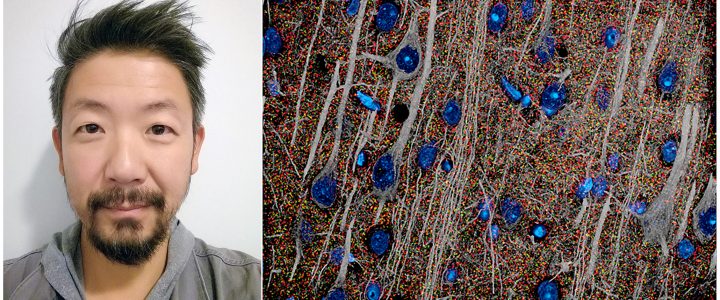by Michael Tranfaglia, MD. In my opinion, the Fragile X clinical trials of AFQ056 sponsored by Novartis failed because of a dose range that was inadequate for Fragile X, and because of the unexpected development of tolerance.
Read moreSearch Results
Pharmacological Tolerance in the Treatment of Fragile X Syndrome

With a $90,000 grant from FRAXA Research Foundation over 2018-2019, Dr. Patrick McCamphill, postdoctoral fellow in Dr. Mark Bear’s lab at Massachusetts Institute of Technology (MIT), is investigating drug tolerance to mGluR5 antagonists, arbaclofen, and other potential Fragile X treatments. He is also exploring ways to overcome it.
Read moreMechanisms of Tolerance to Chronic mGluR5 Inhibition

Over the past few years, both Novartis and Roche sponsored large-scale clinical trials of metabotropic glutamate receptor 5 (mGlu5) negative allosteric modulators (NAMs) to treat Fragile X syndrome (FXS). With a $90,000 grant from FRAXA Research Foundation in 2015-2017, Dr. Mark Bear’s team will explore if mGlu5 NAMs dosed chronically causes tolerance, and if so, how it develops and to probe new avenues to prevent or circumvent it.
Read moreDrug Tolerance in MGluR5 Clinical Trials – Dr Patrick McCamphill 1:1 with FRAXA

We have long suspected that the clinical trials of mGluR5 blockers from Novartis and Roche failed because the drug triggered tolerance, losing effect over time. With a $90,000 grant from FRAXA, Dr. Patrick McCamphill, a Postdoctoral Fellow in the MIT lab of Dr. Mark Bear, is investigating. He does indeed find tolerance, and now he is looking for ways to overcome it.
Read moreAuditory System Dysfunction and Drug Tolerance in the Fragile X Mouse

FRAXA Research Foundation has awarded $90,000 over 2019-2021 to principal investigator Dr. Jay Gibson and postdoctoral fellow Dr. Andrew Holley at the University of Texas Southwestern Medical Center. They are investigating circuit mechanisms for auditory system dysfunction and drug tolerance in the Fragile X mouse model.
Read moreCompound that Inhibits mGluR5 Corrects Signs of Fragile X in Adult Mice
A study finds that a new compound reverses many of the major symptoms associated with Fragile X syndrome (FXS). The paper is published in the April 12 issue of the journal Neuron, describing the exciting observation that the FXS correction can occur in adult mice, after the symptoms of the condition have already been established. Previous research has suggested that inhibition of mGlu5, a subtype of receptor for the excitatory neurotransmitter glutamate, may ameliorate many of the major symptoms of the disease. This study, a collaboration between a group at Roche in Switzerland, led by Dr. Lothar Lindemann, and Dr. Mark Bear’s MIT lab, used an mGlu5 inhibitor called CTEP to examine whether inhibition of mGlu5 could reverse FXS symptoms.
Read moreFragile X Clinical Trial: Novartis Trial Results Are In, and They’re Not Pretty
This year’s Gordon Conference just finished, and Novartis presented their results for the first time (though advisors and advocates had been given a private peak months ago.) To say that the trial results for AFQ056 were disappointing would be the understatement of the century!
Read moreBaclofen: GABA(B) Receptor Supersensitivity and Normalization of Behavioral Abnormalities by Various GABA(B) Agonists Including Baclofen in FMRP Deficient Mice

With $110,000 in grants from FRAXA Research Foundation over several years, Dr. Miklos Toth from Cornell University discovered increased startle response in Fragile X mice and that baclofen can correct this phenotype.
Read moreCoffee, Tea, and Chocolate: Adenosine Receptors in Fragile X

Caffeine is the most popular smart drug in the world. With a $90,000 grant from FRAXA Research Foundation, Alberto Martire, PhD and Antonella Borreca, PhD in Rome, Italy are investigating adenosine receptors antagonists to treat Fragile X syndrome. Compounds which are able to block adenosine receptors are commonly found in tea, chocolate, and coffee.
Read moreBryostatin-1 in Long-term Use Seen to Arrest Fragile X Symptoms in Mouse Model

Long-term, but not short-term, treatment with bryostatin-1 — Neurotrope’s lead investigational therapy — arrested such behavioral and cognitive symptoms as hyperactivity, difficulties with daily life activities, and learning and memory deficits in a mouse model of Fragile X syndrome.
Read moreIn Their Own Words: Reports From the International Fragile X Workshop

The 18th International Fragile X and Related Neurodevelopmental Disorders Workshop in Quebec, Canada, was a great success, featuring Fragile X much more heavily than any previous meeting in this series! We asked our speakers to summarize their work in their own words, with brief updates from researchers investigating Fragile X.
Read moreTetra Releases Full Results of FRAXA-Funded Clinical Trial of PDE4D Inhibitor

Today, Tetra Therapeutics published the full results of its PDE4D trial published the full results to their announcement. Now having reviewed the full results, FRAXA can confidently say that the PDE4D drug trial gives hope to patients and families that Fragile X Syndrome is a treatable disorder, and this particular drug can improve intellectual disability.
Read moreFragile X Clinical Trial of New PDE4D Inhibitor from Tetra

With a $200,043 grant from FRAXA Research Foundation, Dr. Elizabeth Berry-Kravis completed a successful Phase 2 clinical trial of a PDE4 inhibitor for adult men with Fragile X syndrome. This trial treated 30 males, 18-45 years of age with a new PDE4D allosteric inhibitor from Tetra Discovery Partners using a crossover design, so that everyone got active drug for part of the time and placebo for part of the time.
Read morePositive Results Reported in Phase II Fragile X Clinical Trial of PDE4D Inhibitor Zatolmilast from Tetra Therapeutics

Today, Tetra Therapeutics announces the first unequivocally positive phase 2 clinical trial in Fragile X syndrome, press release below. The results do not depend on carving out a subset of patients or post hoc analysis.
Read moreTranscriptional Signatures Sensitive to Cognition-Improving Pharmacological Treatments in Fragile X Syndrome

The Fragile X field needs biomarkers to accurately measure the effects of potential treatments in both Fragile X mice and in humans. Dr. Ozaita and his team have found molecular features in the brain that can serve as an objective signature for the syndrome. They will use this tool to test cannabidiol and two other drugs in mice.
Read moreScreening Combinatorial Pharmacological Therapies for Fragile X Syndrome

FRAXA Research Foundation has awarded a $90,000 research grant to Stanford University principal investigators Dr. Philippe Jacques Mourrain and Dr. Gordon Wang, along with postdoctoral fellow, Dr. Rochelle Coulson. They are evaluating additive effects of combinatorial drug treatments to correct a broad spectrum of deficits observed in Fragile X syndrome.
Read moreClinical Trial of Ganaxolone in Patients with Fragile X Syndrome

With a $90,000 grant from FRAXA Research Foundation funded during 2014-2015, Dr. Frank Kooy and colleagues at the University of Antwerp are conducting a double blind crossover trial of ganaxolone in patients with Fragile X syndrome. Results of this study were mixed (see Marinus: Results from Phase 2 Exploratory Clinical Study Support Continued Development of Ganaxolone in Fragile X Syndrome.)
Read moreTetra’s Fragile X Clinical Trial – The Most Successful So Far

Dr. Mark Gurney, CEO of Tetra Therapeutics, discusses how one of the earliest clues to the biology of Fragile X led to the most successful Fragile X clinical trial to date. FRAXA and Tetra began working together after a key FRAXA-funded study caught the attention of Dr. Gurney. Through the FRAXA Drug Validation Initiative, Dr. Patricia Cogram was able to conduct preclinical validation experiments with Tetra’s lead compound in record time, paving the way for clinical trials.
Read moreParkinson’s Therapy May Hold Promise for Fragile X

A study funded by FRAXA in Italy has encouraging results for people with Fragile X: drugs that block adenosine receptors (A2A) reversed signs of Fragile X in a mouse model.
“One of the most intriguing things about this study is that it points to an entire drug class (not just the one drug used) as potentially therapeutic for Fragile X. Many available compounds block A2A receptors, and we know they are safe and effective.
Read moreNeuren’s Tofinetide Successful in Phase 2 Clinical Trial in Fragile X

We are pleased to share great news adapted from Neuren’s press release: Neuren’s phase 2 trial has successfully established proof of concept and provides a strong rationale for Neuren to move forward with developing trofinetide for Fragile X syndrome. In this initial small trial with a relatively short treatment period, trofinetide was very well tolerated, with the high dose (70 mg/kg twice daily) demonstrating a consistent pattern of clinical improvement, observed in both clinician and caregiver assessments.
Read more
